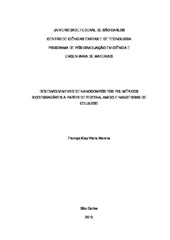Desenvolvimento de nanocompósitos poliméricos biodegradáveis a partir de pectina, amido e nanofibras de celulose

Ver/
Fecha
2010-09-16Autor
Moreira, Francys Kley Vieira
Metadatos
Mostrar el registro completo del ítemResumen
The objective of this project was the preparation of biodegradable films from polymer blends of citrus pectin (PEC) and thermoplastic starch (TPS) and the modification of its mechanical properties by formation of nanocomposites with cellulose nanofibers (NCel). The project was conducted in three stages. Firstly, the nanofibers were obtained from bleached sugarcane bagasse fibers (FBC) by hydrolysis with hydrochloric (HCl) and sulfuric (H2SO4) acids. The characterizations revealed nanofibers with needle-like morphology and diameters lower than 20 nm. The thermal stability of NCel obtained with HCl was higher than H2SO4 one. In the second stage, a factionary factorial design was applied to define a suitable processing condition for TPS/PEC blends (100/0, 75/25, 50/50, 25/75 e 0/100) in a mixer Haake, with posterior microstructural and mechanical characterizations of the blends. It was defined the condition of 130ºC, 160 RPM and 4 min to processing TPS/PEC blends, which showed biphasic microstructure and mechanical strength decreased by increase of TPS content. Due to this, NCel were incorporated at concentration of 1, 5, 10 and 15% (w/w) in the processing under different mixture conditions, aiming the improvement of the mechanical performance of the TPS/PEC blend 50/50. The characterization results evidenced that water vapour permeability, tensile strength and elastic modulus of the blend were significantly improved in 48, 150 and 350%, respectively, only with 5% of NCel. The better results were obtained by use of NCel-S and mixture of the nanocomposite formulations into milling ball equipment. The study of this project evidences the great potential of the cellulose nanofibers to the improvement of the properties in biodegradable polymeric systems based in pectin and starch natural polymers.